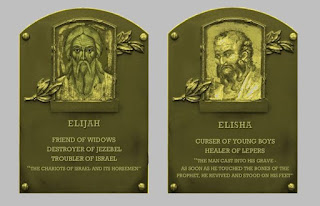Valedictory
Uncle Albert said last week he was taking a break from religion. “What do you mean? I don't understand,” I said.
“To pursue paganism,” he said, tongue-in-cheek, I think. Still, I wanted to say, “Instead of Episcopalianism?” not quite tongue-in-cheek. But not even I am as meanly Puritan, as Calvinist, as that. Instead I said,
“Do you want to join a coven?”
“Oh, no!” he said. “Not organized paganism. How dreary!”
Which was as far as the conversation went because I didn't know what to say next. But: “Okay,” I did say, and Uncle Albert said, “Okay.” And that was that until he brings it up again as I am afraid he will.
It was just as well since it meant I wouldn’t have to take him to Episcopalianism as Roz wanted to go to hear the Narrow Man — “one last time,” she said.
“I don’t understand,” I said.
“This is to be his last sermon,” Roz said, “his valedictory.”
“How do you know that?”
“He told me.”
“Oh,” I said.
 |
| Sluggish Fan Presbyterian Church |
It was at the same country church, where we’d heard him once before, and there was the same dust in the air almost four years later, the same fan blades turning so slowly they couldn’t move it.
The sermon was from II Kings 2, the story of how Elisha succeeds Elijah as the prophet of God in Israel. I knew the story, but I didn’t need to have as the Narrow Man read it, and then he retold it, as Presbyterian preachers often do. Here is the story, but I promise you the preacher will retell it.
He reminded us that Elijah had already anointed Elisha sometime before,* but now it was time for Elijah to go and the younger prophet to take over.
Elijah knows this, that it is time to go. Elisha knows this, that Elijah is going. Elijah would like, it seems, simply to fade away — or to disappear as suddenly as he appeared at the beginning of his story. And isn’t he always doing that, appearing here, disappearing there, appearing here again.
But Elisha will not allow that this time — Elijah to fade away or to disappear without a trace. He has to see what is going to happen, through to the end of it. So he follows Elijah step by step the long length of his last day’s journey: To and from Gilgal to Bethel, to and from Bethel to Jericho, to and from Jericho to the Jordan, and dry-footed across to the other side — a trek of at least 14 “U.S. miles,” the Narrow Man said.
Finally, Elijah wearies, it seems, both of the journey and of Elisha, and he finds himself asking, “Just what do you want? What? Really!” And Elisha replies, “a double share of your spirit,” by which he means the portion the eldest son would inherit from his father. We’re not sure exactly what Elijah makes of this, but he declares it to be “a hard thing,” though if Elisha stays alert to the end, then maybe. “Yes, okay!” Elijah says.
And he does, Elisha, he watches to the end and somehow — this doesn’t seem physically possible to me, but it didn’t seem to bother the Narrow Man; at least, he didn’t comment on it — somehow Elisha does see Elijah disappear.
Elijah’s other followers, crouched on the other side of the river, the sons of the prophets, do not. What they do see as he returns is that Elisha has taken up the mantle of Elijah and that when he rolls it up as Elijah did and strikes the river as Elijah did, the waters part. And, unwillingly it seems, they gasp out, “The spirit of Elijah now rests on Elisha.”
“I say unwillingly,” the Narrow man said, “because they do not, they will not, let Elijah go.” He has come and gone and come back again before. So, no! He can’t be gone for good. They need to go look for him — he has to be somewhere. Elijah disagrees, and at first he says, “No. Don’t bother.” But the sons of the prophets persist, and they shame him into saying, “Well, okay.” And they search for three days with 50 men; but they do not find Elijah. They will not find Elijah.
“Because Elijah is gone,” the Narrow Man exclaimed. The succession narrative is not just about the successor; it is about the predecessor as well. Who knows that it is time to go and who goes. “This is not a political sermon, thought it could be,” the Narrow Man then said. And that is all he said.
He sat down. We sang a hymn, “Lord, Dismiss Us With Thy Blessing.” And we went home.
 |
| From the Southern Baptist Hebrew Prophets Hall of Fame |
Roz drove because she always drives. I didn’t say anything, and she didn’t say anything either. Uncle Albert didn’t ask anything when we got home.
In fact, he had a visitor, Maggie, who used to live with him before COVID. She’d since graduated online and gotten a job with Maxine Waters.
I started to say that the preacher had spoken of the Representative in the morning sermon, but Roz somehow guessed what I was going to say before it was half out of my mouth and stopped me: Had Maggie and Uncle Albert had anything to eat? she asked.
06.28.22
_______________
No comments:
Post a Comment